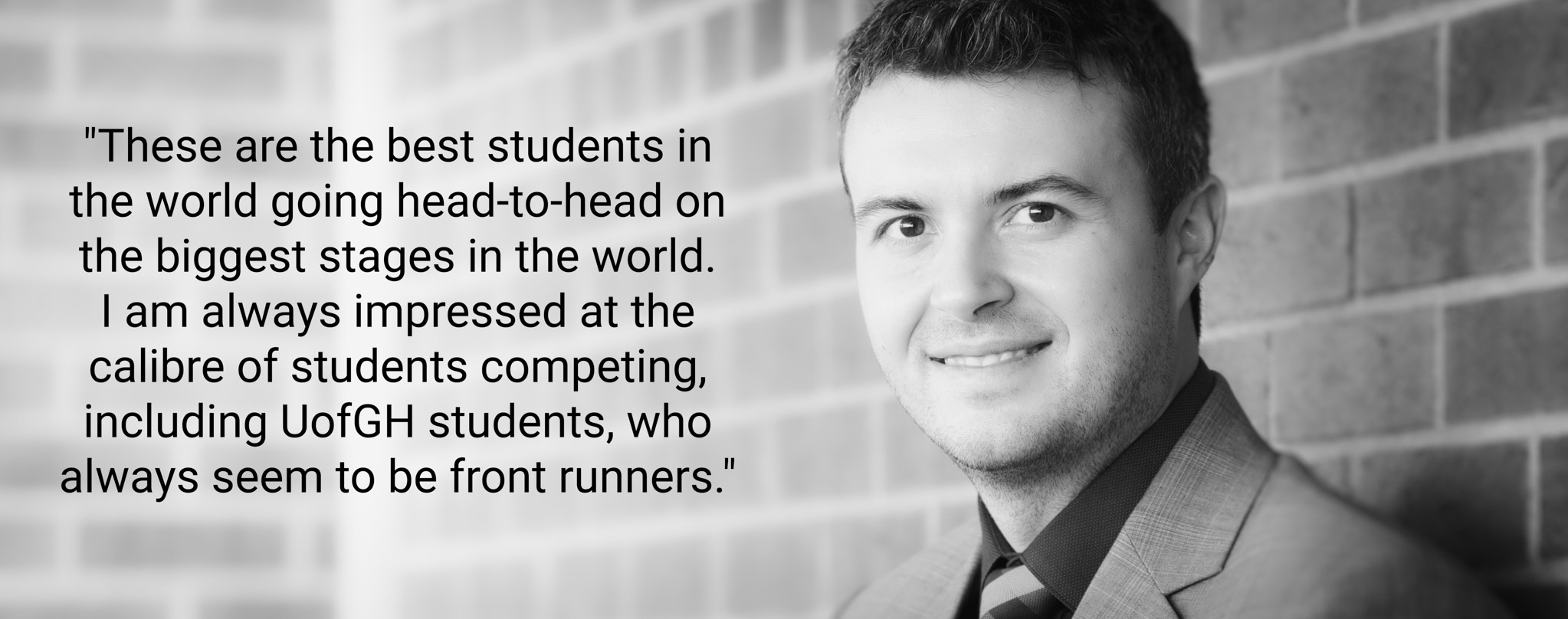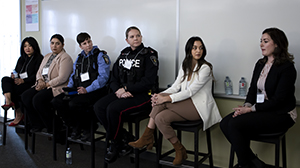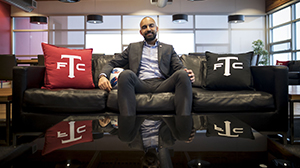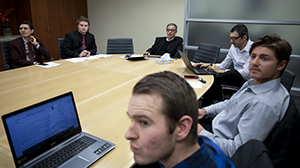- Future Students
- Current Students
- Faculty
- Staff
- Alumni
- Others
UofGH makes Top 6 in global CFO Case Study Competition

For the third consecutive year, a team of four University of Guelph-Humber students has advanced to the Top 6 of the prestigious, global CFO Case Study Competition, earning an all-expenses-paid trip to Johannesburg, South Africa to compete in the final rounds.
UofGH’s team – composed of Business students Alexis Del Papa, Jessica Gomes and Daniel Bielak and Justice Studies student Maheen Nazim – will compete against students from Brown University as well as institutions from India, Germany, Nigeria and South Africa.
The final two rounds will be held on the floor of the Johannesburg Stock Exchange Oct. 13 and 14.
To make it this far, UofGH had to overcome a fiercely competitive field of 580 teams – 2,300 students total – from 86 universities in 48 countries and six continents.
The University of Guelph-Humber is looking to repeat as champions, after a team of four students and alumni travelled to Johannesburg, South Africa last year to win the 2019 CFO Case Study Competition.
UofGH was the first North American university to do so.
“It is not luck that we have been awarded a spot in the Top 6 for three consecutive years,” said Acting Business Program Head Justin Medak, who trains UofGH students for case competitions at all levels. “Each team member trains from September to February, slowly building their case competition skills. The case competition program is very rigorous and pushes students outside of their comfort zone.
“These are the best students in the world going head-to-head on the biggest stages in the world. I am always impressed at the caliber of students competing, including University of Guelph-Humber students who always seem to be front runners at many international competitions.”
Inside the team’s preparation
So far in the competition, UofGH’s team had to submit four deliverables through numerous elimination rounds, including a creative team presentation performed while social distancing, as well as a board report recommending solutions to strategic issues faced by the British Petroleum (BP) Company.
Medak says the team formally trains for four-to-six hours per week, it is the work the students do in between training sessions that pays dividends. They exchange emails, watch videos, analyze other teams’ performances, research and practise presentation skills for up to an additional 10 hours per week.
Collectively, the team has invested hundreds of hours into this competition.
“All this preparation is done before the competition even begins so students can focus on solving the case once the competition opens on March 1,” Medak said.
Del Papa said that while the preparation was daunting, the team was united in its commitment and work ethic.
“All the members of our teams have put in many hours into training and researching for this competition,” she said. “Each team member has something special and different they bring to the team. The training from our coach Justin along with the hundreds of hours of work that has gone into this competition is what I believe has set us apart from other teams. We also tried our best to really focus on the details and to be original while also keeping what has worked in the past from the previous UofGH teams.”
In fact, several members of the team cited COVID-19 as the biggest hurdle to collaborating.
“I feel confident going into the next rounds with our team because truly, our biggest challenge was dealing with the reality of COVID-19 while competing,” Nazim said. “The lessons we learned about communication and teamwork were invaluable because of the lockdowns. I am extremely excited to put these skills to the test in South Africa.”
Aiming for a repeat performance
The fact that UofGH enters the final rounds as the defending champion can translate into pressure on the competitors, but it also gives them confidence.
Looking back at the recent years of case competition success that UofGH has enjoyed, both at the CFO competition and beyond, the team members say that it’s not an accident. Instead, it’s because of a strong system that has been developed to train, prepare, teach and support students participating in case competitions.
“We are very fortunate to have a strong network at UofGH, like our coach Justin Medak and alumni with competition experience, who encourage us to build our strengths so that when it comes time to enter the competition we are prepared to stand on our own in such an environment,” Gomes said. “It’s that training and support that has allowed for the University of Guelph-Humber to do well three years in a row despite the fact that the CFO presents such new and differing challenges each year with their in-depth cases.”
Bielak, the only member of last year’s winning team to compete again this year, agreed.
“Our success comes down to four things: foundational understanding, practice, individual mentality and team cohesion,” said Bielak, who began competing in his first year. “The foundational understanding comes from the great coaching provided by Justin Medak. It also comes from the knowledge gained from the programs at UofGH.
“Then, you need to practise – a lot. If you practise a lot then you will be better prepared to handle anything thrown at you. An individual’s mentality matters, if each team member is willing to put in the hard work, to dedicate time to do their absolute best then something great can happen. Finally, if your team doesn’t operate like a supportive team to get through tough days, it will collapse. It needs to be a trusting environment.
“That’s why UofGH has had so much success, every team that has won nationally and internationally has had these four things.”







